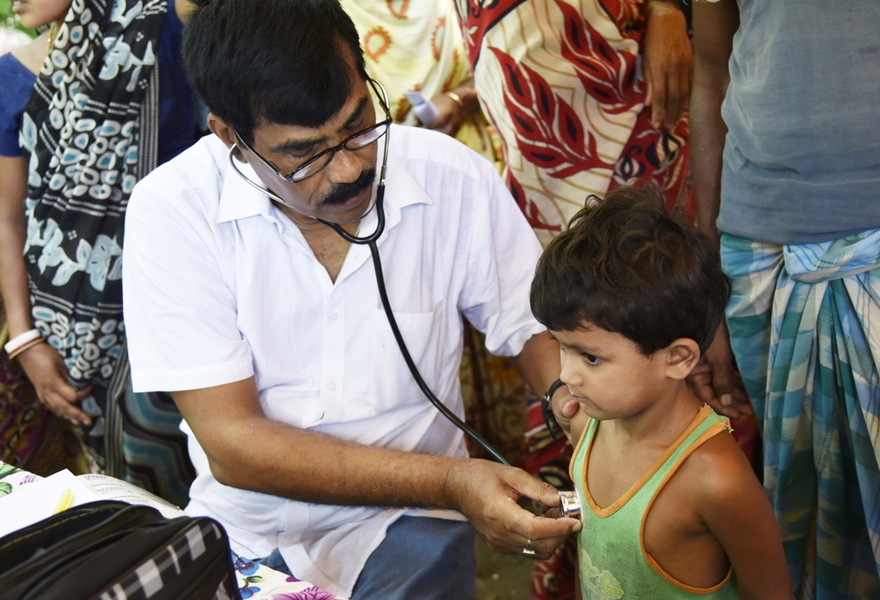MCC co-authors eminent scientific assessment on health and climate change
Max Callaghan and Jan Minx use artificial intelligence to map out the scientific publication landscape for the new edition of the “Lancet Countdown”.

Treatment of a flood victim in India: the climate crisis is affecting health – hundreds of millions of people are already suffering. | Photo: Shutterstock/David
Global heating increasingly and measurably threatens human health and survival – this is what the “Lancet Countdown on Health and Climate Change 2022” documents for the whole world and key regions. “The climate crisis is killing us,” warns UN Secretary-General António Guterres on the occasion of this year's publication. For the first time, the Berlin-based climate research institute MCC (Mercator Research Institute on Global Commons and Climate Change) has been involved in this eminent annual scientific assessment. The report compiles a broad set of indicators in a global research network, and has now been published in renowned medical journals: the global report in The Lancet, and a new European edition in The Lancet Public Health.
Now in its seventh year, the Lancet Countdown is coordinated by University College London, and produced by 99 experts from 51 institutions, including the World Health Organization (WHO) and the World Meteorological Organization (WMO). MCC uses an approach rooted in artificial intelligence to provide one of the report's 43 indicators that maps out the scientific publication landscape on human health and climate change. The core message reads: the number of studies investigating this connection rose rapidly by 22 percent last year, to more than 3,200.
“To filter out the state of knowledge on health impacts from the vast climate research literature, and break it down by content and geography, we use methods of so-called supervised machine learning,” reports Max Callaghan, postdoc in the MCC working group Applied Sustainability Science, and co-author of the new Lancet Countdown. “These methods enable us to identify and classify relevant studies as well as automatically extract study locations. In the long-term analysis of content, for example, it shows that research on climate damage, i.e. human health implications of global heating, dominates at 86 per cent – and research on climate solutions, i.e. climate mitigation and adaptation, is lagging behind, but gaining ground."
MCC has contributed the elaborately produced data on the research landscape not only to the global and the European Lancet Countdown, but also to regional versions for China and South America. “We are very pleased to now be part of this world-leading scientific assessment on climate and health,” says Jan Minx, MCC group leader and also co-author. “This assessment highlights the urgent need for world leaders to enhance their actions on global heating, because hundreds of millions of people are already suffering from the impacts of the climate crisis and the burning of fossil fuels. The fact that we are now part of this shows that MCC is succeeding with its strategic approach to use research synthesis supporting evidence-based policy to halt global heating and protect human health.”
Reference of the cited articles:
- Romanello, M., Di Napoli, C., Drummond, P., Green, C., Kennard, H., Lampard, P., et al., 2022, The 2022 report of the Lancet Countdown on health and climate change: health at the mercy of fossil fuels, The Lancet
https://www.sciencedirect.com/science/article/pii/S0140673622015409?dgcid=coauthor#bib287 - Van Daalen, K., Romanello, M., Rocklöv, J.,Semenza, J., Tonne, C., Markandya, A., et al., 2022, The 2022 Europe report of the Lancet Countdown on health and climate change: towards a climate resilient future, Lancet Public Health
https://doi.org/10.1016/S2468-2667(22)00197-9 - Cai, W., Zhang, C., Zhang, S., et al., 2022, The 2022 China report of the Lancet Countdown on health and climate change: leveraging climate actions for healthy ageing, Lancet Public Health
https://authors.elsevier.com/sd/article/S2468-2667(22)00224-9





